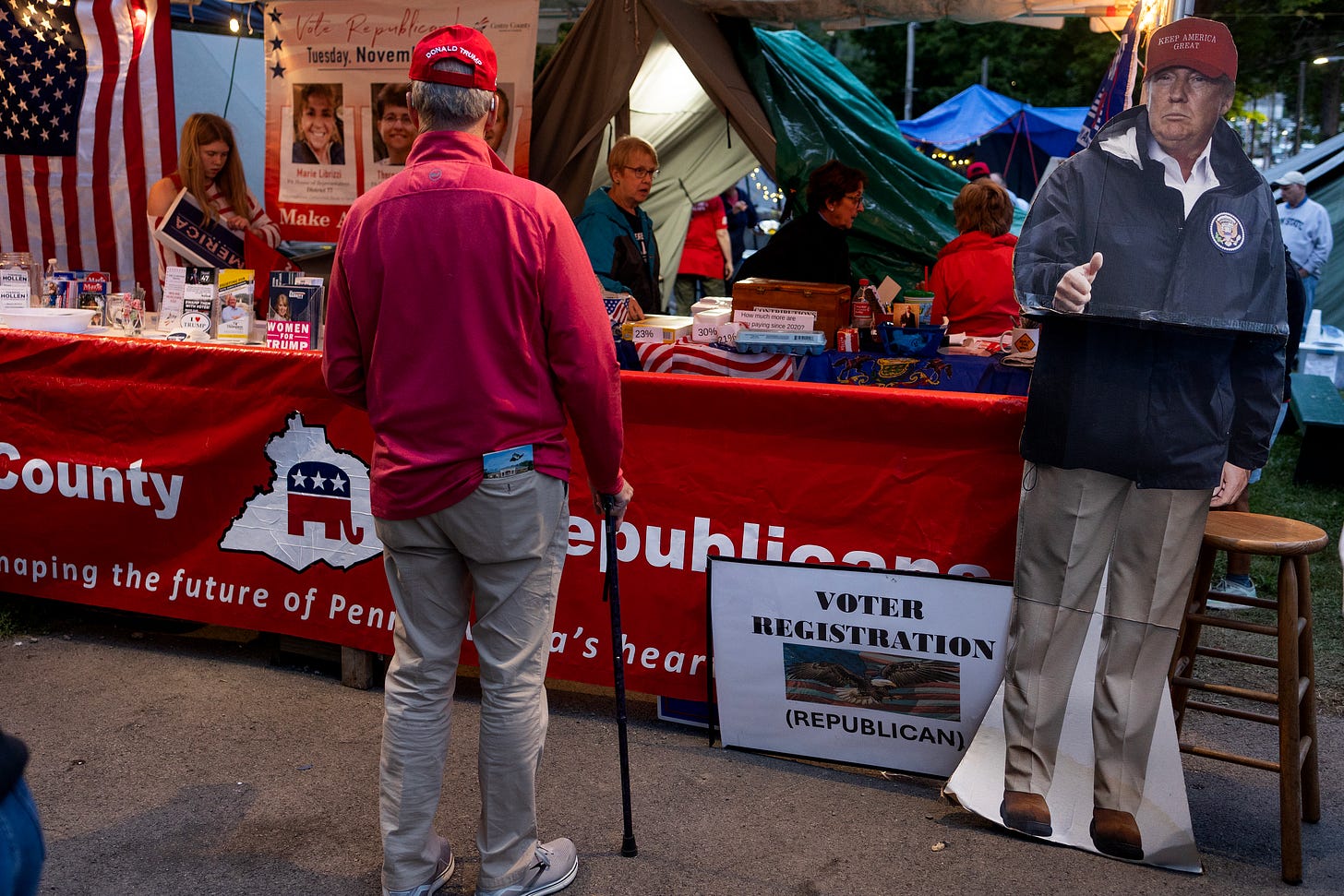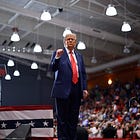An Unthinkable Plunge
Why rational voters take the reckless step of weakening democracy.
It’s happened. And it’s bad. America has elected as president a man who doesn’t really bother hiding his authoritarianism. Again. It is alarming. And yet to give way to alarmism at a time like this is a mistake. If American democracy is to survive the test of the next four years—and no, that is not a given—it will be because we’ve understood clearly what this moment means.
To those of us raised to revere constitutional democracy, seeing millions of people line up to vote to weaken constitutional democracy will always be upsetting. Yet in voting for a candidate who promised to use the repressive power of the state to persecute and punish his political opponents, who refused to accept a previous election defeat and rails against the notion that anything lies outside the president’s powers, tens of millions of Americans have just done precisely that. It feels inexplicable.
But it isn’t.
Political scientists have thought carefully about the kind of situation we’re in. Back in 2011, Daron Acemoglu and James A. Robinson, who just won the Nobel Prize in Economics, wrote a paper together with Ragnar Torvik titled “Why Do Voters Dismantle Checks and Balances?” that doubles as a Rosetta Stone to our political moment.
Acemoglu, Robinson and Torvik built a model to show there are circumstances where it is rational for voters to prefer leaders who reject democratic institutions. This doesn’t normally happen in well-functioning democracies. But where unelected elites have outsized power, checks and balances can function to hem politicians in, preventing them from enacting policies a majority of voters want. In those circumstances, voters can rationally interpret a leader’s disdain for democratic institutions as a feature, not a bug: checks and balances come to be seen as the eggs you have to crack to make the democratic omelet.
Granted, Acemoglu, Robinson and Torvik were thinking of leftist Latin American autocrats like Hugo Chávez, Rafael Correa and Evo Morales when they built their model, not of a right-wing real estate billionaire. They built their model to explain why poor people sometimes prefer left-wing autocrats, even if they’re corrupt, so long as they’ll redistribute enough income to them. Trump may be corrupt, but he’s no leftist, and his agenda is far from redistributionist. Yet the dynamics Acemoglu, Robinson and Trovik describe as giving rise to people’s active preference for an autocrat fit the American mold a little bit more neatly than we should be comfortable with.
Their key insight is that political elites often use checks and balances to prevent elected leaders from enacting policies the elites reject, even if large majorities of voters want them. And it’s not hard to come up with a list of policies that large majorities of Americans favor but that can’t be enacted because they offend the sensibilities of the liberal elite. Ruy Teixeira put together such a list just before the election, including hard-line border policies, zero-tolerance policing against social disorder, a race-blind attitude to distributional conflicts in society, and policies to develop and exploit America’s fossil fuel resources.
In each of these areas, large majorities of voters came to actively reject attitudes that metropolitan elites supported more or less unanimously. Voters get it that those elites have power beyond their electoral numbers, because they’re hugely dominant not just in the administrative state but also in the knowledge making institutions—from universities and newsrooms to think tanks and activist organizations—that incubate the policy ideas the administrative state then embodies.
For voters in the broad swathe of the heartland who had seen the economic vitality of their communities shattered by the twin forces of globalization and automation, cultural distrust of coastal elites became bound up with a sense of economic abandonment: 5.5 million industrial jobs were lost from 2000 to 2017, and the state seemed incapable of or uninterested in doing anything about it. The collapse in heartland voters’ willingness to defer to the judgment of coastal elites has driven them in a strange and destructive direction, but it didn’t come out of nowhere. You can understand why they would despair of ever seeing their priorities enacted given what they came to see as overwhelming evidence of elite disinterest in them, and antipathy towards their values. From their standpoint, voting to weaken the guardrails of democracy looks not like an act of mindless vandalism, but like a rational rejection of a status quo rigged against both their material interests and their cultural values.
If the American polity isn’t going to break apart completely over the next four years, it’s important for everyone to accept Trump voters as rational actors. Acemoglu, Robinson and Torvik theorize that voters can come to see even the corruption that their preferred candidate is sure to engage in as a price worth paying for the enactment of policies that have no chance otherwise. The calculus Trump’s supporters have made may be appalling, it may be reckless—surely it is—and it may spectacularly backfire.
But irrational it is not.
On a day like today, your gut will surely rebel against this insight. But at times like these, when despair threatens to run away with us, it’s important to assert your mind’s primacy over your gut.
We’re in for a long, exceptionally dangerous, endlessly trying four years with democracy’s warning lights flashing red more or less continually. It may or may not be possible to arrest the slide that begins today. But if we’re to have any chance, we’d best keep our wits about us.
Francisco Toro is a contributing editor at Persuasion and writes the Substack One Percent Brighter.
Follow Persuasion on Twitter, LinkedIn, and YouTube to keep up with our latest articles, podcasts, and events, as well as updates from excellent writers across our network.
And, to receive pieces like this in your inbox and support our work, subscribe below:







Let's go a step further. Maybe, just once, it would be a good idea to expend a little energy and time actually contemplating what Trump voters are seeing that you and corporate media are missing because you dwell in groupthink world. I have spent the last 10 years second guessing myself and fighting against coming to at least respect Trump's persistence, doggedness, energy, etc even if I still dislike him. But the last year or so when many liberal journalists and commentators began being alarmed at the same things I was seeing in the Democratic party, people who have been surveying the landscape in much more detail over the past decades than I have, started writing about the same things I've been seeing, it made me realize that I'm not the only one thinking the emperor has no clothes. The Dems have become The Establishment. Dick Cheney, one of the most reviled people in politics and one of the architects of the Iraq war, on their side says it all. If we are in a dangerous place, it's because the Democrats and their bitter hatred of Trump have put us here. Imagine if in 2016, there had been true introspection about what happened and a 'this too shall pass' attitude. But the opposite happened. If there is one take away here, it's that the American people can be trusted to swing the pendulum back the other way when things get too out of balance. Maybe they know more than you give them credit for.
Or, possibly, your description of what's in the heads of Trump voters is actually only in 𝘆𝗼𝘂𝗿 head.